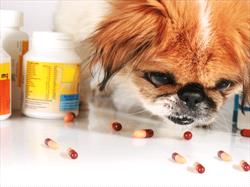Serotonin syndrome is a serious drug reaction to medications that build up high levels of serotonin in the body. A chemical that the body produces naturally, serotonin is needed for the brain and nerve cells to function properly. Medications such as those used to treat human depression, attention deficit hyperactivity disorder, seizures, and pain; illicit drugs such as LSD or ecstasy; dietary supplements including SAMe, St. John's wort, ginseng, turmeric, Garcinia extract, and Garcinia cambogia; and even certain foods with high levels of tryptophan, such as salmon, spinach, poultry, milk, eggs, nuts, and soy products can all contribute to serotonin syndrome.
In veterinary medicine, serotonin-enhancing medications are often used to treat behavioral issues such as separation anxiety, fear of fireworks, storm phobia, compulsive disorders, aggression, and house-soiling behavior. Serotonin syndrome may occur with the start of a new medication, dosage change, or combining of medications. However, it is most commonly seen when a pet accidentally ingests medication prescribed to a human in the household.
Dog with pills

Photo courtesy of Depositphotos.
Diagnosis is often based on the history of ingestion and clinical signs. Signs may appear anywhere from 1 to 12 hours after ingestion. Symptoms generally last about 24 hours but can extend for several days. Most animals will show GI upset, such as vomiting, diarrhea, and a loss of appetite. Other common symptoms include:
- dilated pupils
- increased heart rate
- fever
- muscle tremors or jerking
- restlessness
- difficulty walking
- agitation
- excitation
- disorientation
- vocalization
- seizures
Serotonin syndrome can be a life-threatening situation, therefore, if you think your pet is developing it, visit a veterinarian immediately. Make sure to bring all the prescriptions that your pet may have ingested with you. Don't forget to mention any over-the-counter dietary or herbal supplements your pet is taking because they could be a cause as well.
Treatment will vary based on clinical signs. Depending on the severity, hospitalization may be needed. Prognosis depends on what your pet swallowed, how much, and how long they have been symptomatic.
Savanna Bruce, Veterinary Class of 2024 contributed to this article.